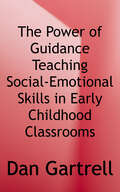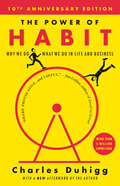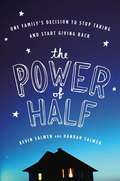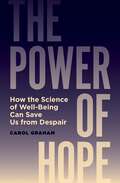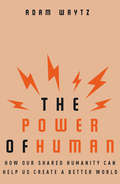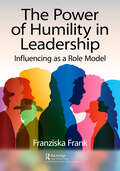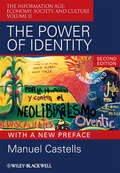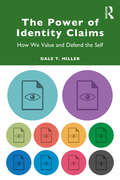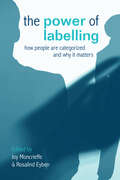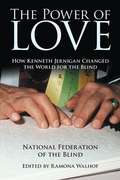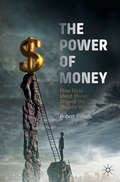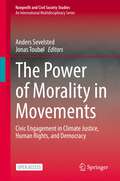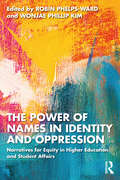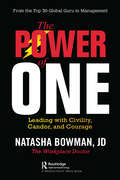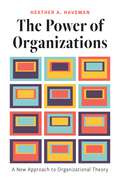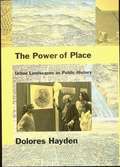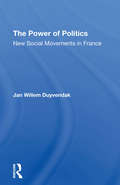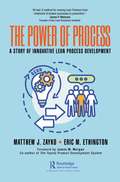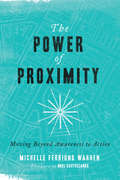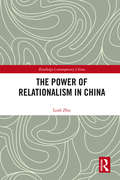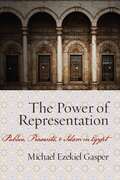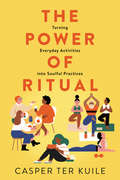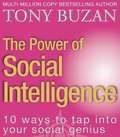- Table View
- List View
The Power of Guidance: Teaching Social-emotional Skills in Early Childhood Classrooms
by Dan GartrellChildcare providers and teachers in preschool and primary grade settings will greatly value the collection of writings in The Power of Guidance: Teaching Social-Emotional Skills In the Early Childhood Classroom. The writings provide a concise yet multi-faceted overview of the guidance approach used with this age group. The book examines the differences between patience and understanding and between misbehavior and mistaken behavior, important distinctions that must be made in order to understand and deal with various behaviors using the guidance approach. Readers also will learn the components of an encouraging classroom and strategies for maintaining it, leading to non-punitive approaches for classroom management. One chapter puts particular focus on intervention strategies with boys, a topic readers often seek out. The book has the distinction of being selected as a comprehensive member benefit for the NAEYC for 2003.
The Power of Habit: Why We Do What We Do in Life and Business (Playaway Adult Nonfiction Ser.)
by Charles DuhiggA young woman walks into a laboratory. Over the past two years, she has transformed almost every aspect of her life. She has quit smoking, run a marathon, and been promoted at work. The patterns inside her brain, neurologists discover, have fundamentally changed. Marketers at Procter & Gamble study videos of people making their beds. They are desperately trying to figure out how to sell a new product called Febreze, on track to be one of the biggest flops in company history. Suddenly, one of them detects a nearly imperceptible pattern--and with a slight shift in advertising, Febreze goes on to earn a billion dollars a year. An untested CEO takes over one of the largest companies in America. His first order of business is attacking a single pattern among his employees--how they approach worker safety--and soon the firm, Alcoa, becomes the top performer in the Dow Jones. What do all these people have in common? They achieved success by focusing on the patterns that shape every aspect of our lives. They succeeded by transforming habits. In The Power of Habit, award-winning New York Times business reporter Charles Duhigg takes us to the thrilling edge of scientific discoveries that explain why habits exist and how they can be changed. With penetrating intelligence and an ability to distill vast amounts of information into engrossing narratives, Duhigg brings to life a whole new understanding of human nature and its potential for transformation. Along the way we learn why some people and companies struggle to change, despite years of trying, while others seem to remake themselves overnight. We visit laboratories where neuroscientists explore how habits work and where, exactly, they reside in our brains. We discover how the right habits were crucial to the success of Olympic swimmer Michael Phelps, Starbucks CEO Howard Schultz, and civil-rights hero Martin Luther King, Jr. We go inside Procter & Gamble, Target superstores, Rick Warren's Saddleback Church, NFL locker rooms, and the nation's largest hospitals and see how implementing so-called keystone habits can earn billions and mean the difference between failure and success, life and death. At its core, The Power of Habit contains an exhilarating argument: The key to exercising regularly, losing weight, raising exceptional children, becoming more productive, building revolutionary companies and social movements, and achieving success is understanding how habits work. Habits aren't destiny. As Charles Duhigg shows, by harnessing this new science, we can transform our businesses, our communities, and our lives.From the Hardcover edition.
The Power of Half: One Family's Decision to Stop Taking and Start Giving Back
by Kevin Salwen Hannah SalwenIt all started when 15-year old Hannah Salwen, idealistic, but troubled by a growing sense of injustice in the world, had a eureka moment when a homeless man in her neighborhood was juxtaposed against a glistening Mercedes coupe "You know, Dad," she said, pointing, "If that man had a less nice car, that man could have a meal." This glaring disparity let the Salwen family of four, caught up like so many other Americans in this age of consumption and waste, to follow Hannah's urge to stop talking and start doing. And so they embarked on an incredible journey together, deciding to sell their Atlanta mansion, downsize to a house half its size, and give half of their profits to a worthy charity Each week they met over dinner to discuss their plan. At first it was an outlandish scheme. "What, are you crazy? No way!" Then it was a challenge. "We are TOTALLY doing this." It would transport them across the globe and well out of their comfort zone. In the end they found a needy village in Ghana where their commitment of funds and their unwavering follow through would change the lives of hundreds, for good. It would also alter irrevocably the lives of four normal Americans who learned together that half could be so much more. With deft prose, an unassuming tone, and an endearing sense of humor, The Power of Half chronicles this remarkable, unlikely journey, this reimagining of the American dream, one family at a time. It also offers readers a very accessible road map to employ the power of half to their own lives, no matter one's means or resources. In that way, it shows readers, how to connect their families through a unifying purpose, an antidote to the splintering of American families in this era of iPods, video-gaming, and other solo activities.
The Power of Hope: How the Science of Well-Being Can Save Us from Despair
by Carol GrahamWhy hope matters as a metric of economic and social well-beingIn a society marked by extreme inequality of income and opportunity, why should economists care about how people feel? The truth is that feelings of well-being are critical metrics that predict future life outcomes. In this timely and innovative account, economist Carol Graham argues for the importance of hope—little studied in economics at present—as an independent dimension of well-being. Given America’s current mental health crisis, thrown into stark relief by COVID, hope may be the most important measure of well-being, and researchers are tracking trends in hope as a key factor in understanding the rising numbers of “deaths of despair” and premature mortality.Graham, an authority on the study of well-being, points to empirical evidence demonstrating that hope can improve people’s life outcomes and that despair can destroy them. These findings, she argues, merit deeper exploration. Graham discusses the potential of novel well-being metrics as tracking indicators of despair, reports on new surveys of hope among low-income adolescents, and considers the implications of the results for the futures of these young adults.Graham asks how and why the wealthiest country in the world has such despair. What are we missing? She argues that public policy problems—from joblessness and labor force dropout to the lack of affordable health care and inadequate public education—can’t be solved without hope. Drawing on research in well-being and other disciplines, Graham describes strategies for restoring hope in populations where it has been lost. The need to address despair, and to restore hope, is critical to America’s future.
The Power of Human: How Our Shared Humanity Can Help Us Create A Better World
by Adam WaytzAn urgent yet hopeful analysis of the surge in dehumanization, and how we can reverse it. The unprecedented access to other humans that technology provides has ironically freed us from engaging with them. Thanks to social media, we can know a campaigning politician’s platform; an avid traveler’s restaurant recommendations; and the daily emotional fluctuations of our friends without ever even picking up the phone. According to social psychologist Adam Waytz, our increasingly human-free lives come with a serious cost that we’ve already begun to pay: the loss of our humanity. Humans have superpowers. More than any other psychological stimulus, our presence can make experiences feel significant, inspire moral behavior, and encourage action. Recent studies suggest that we even have power over mortality—the survival rate of individuals with stronger social relationships has been found to be twice as high as those with weak relationships. The Power of Human shows us how to rehumanize and harness these unique abilities to improve our lives, beginning with our jobs. The remedy for the dehumanized worker is twofold. Employers, Waytz argues, must instill humanity into work by capitalizing on distinctly human skills, especially sociability and variability. Meanwhile, workers need to put to rest the idea that you are what you do and instead detach their personal identities from their occupations. Waytz offers a similarly science-based method to counter the rising threat that technology poses to our humanity, outlining how we can design human-machine partnerships that optimize the strengths of both parties. Finally, he reveals how, by humanizing intimacy and conflict in unexpected ways, we can strengthen relationships with both our friends and enemies. Essential reading for individuals and institutions alike, The Power of Human explains how we can solve one of our time’s biggest problems by better utilizing the influence we have on one another.
The Power of Humility in Leadership: Influencing as a Role Model
by Franziska FrankTo many people, the words ‘leader’ and ‘humble’ are not natural bedfellows. Yet once they have grasped the definition most employees desire a humble leader, while a majority of managers believe they already are one. What appears deceptively simple is trickier than expected. Narcissism, lack of perception, fixed mindsets, and neuronal default settings are only a few of the stumbling blocks on the path to humility. What exactly is this sought-after humility? Humility consists of four key elements: 1) Seeing one’s own strength and weaknesses and revealing them where needed for the bigger picture; 2) Appreciating others for what they are, do now and can do; 3) Being open and willing to learn; 4) Understanding that we are all only a small part of a larger picture, easily replaceable and favored by luck and circumstance. Therefore, humility has nothing to do with being weak or hiding the light under the bushel. Instead, it is about clarity, taking a step back from one’s ego and thus being able to serve the greater picture. The author’s own research with more than 2,000 managers contributes to the canon of positive effects of humility that have been measured by dozens of researchers during the last decade. Humility benefits employees (ranging from better performance, more innovation, stronger resilience to better client relations, and stronger morals), the organization (ranging from better ambidextrous strategies, a better culture to fewer sunk costs) and the managers themselves (ranging from more seen leadership potential to less stress and better relationships with employees). Dozens of case studies, quotes from more than 150 interviews with top managers, lively storytelling of real-life examples, and solid research with actionable take-aways, plus personal assessments, make this an eminently readable and practical book for managers worldwide.
The Power of Identity: Economy, Society, And Culture (Information Age Series #14)
by Manuel CastellsIn this second volume of The Information Age trilogy, with an extensive new preface following the recent global economic crisis, Manuel Castells deals with the social, political, and cultural dynamics associated with the technological transformation of our societies and with the globalization of the economy. Extensive new preface examines how dramatic recent events have transformed the socio-political landscape of our world Applies Castells’ hypotheses to contemporary issues such as Al Qaeda and global terrorist networks, American unilateralism and the crisis of political legitimacy throughout the world A brilliant account of social, cultural, and political conflict and struggle all over the world Analyzes the importance of cultural, religious, and national identity as sources of meaning for people, and its implications for social movement Throws new light on the dynamics of global and local change
The Power of Identity Claims: How We Value and Defend the Self
by Dale T. MillerThis book draws on research in psychology and behavioral economics to show how striving to live up to our identity claims profoundly affects our daily lives. The author argues the claims we make about who we are and what we stand for powerfully influence us, and our social world. Asking questions such as: Why do people resist the temptation to cheat when cheating would benefit them greatly and no one would find out? Why do people express different beliefs about climate change when they are first reminded of their political affiliation? Why do people prefer to be compensated for donating blood with cholesterol screening than with money? Miller puts forth a novel and compelling argument regarding how strongly our identity claims affect our daily lives. The book provides explanations for many forms of puzzling behavior, such as why people sometimes act against their economic self-interest, how they avoid situations that test their moral identities, and how they respond to failures to live up to their moral identities. It paints an intriguing picture of people’s investment in their identity claims by showing how they seek opportunities to demonstrate their validity, avoid actions and circumstances that challenge their legitimacy, and employ psychological defenses when others challenge their legitimacy. Based on extensive research in the fields of psychology, economics, and political science, this book is fascinating reading for students and academics interested in identity and the self. It also provides an expanded tool kit for those who seek behavioral change in their organization or community.
The Power of Labelling: How People are Categorized and Why It Matters
by Rosalind Eyben Joy MoncrieffeWhat does it mean to be part of the mass known as ?The Poor?? What visions are conjured up in our minds when someone is labelled ?Muslim?? What assumptions do we make about their needs, values and politics? How do we react individually and as a society? Who develops the labels, what power do they carry and how do such labels affect how people are treated? This timely book tackles the critical and controversial issue of how people are labelled and categorized, and how their problems are framed and dealt with. Drawing on vast international experience and current theory, the authors examine how labels are constituted and applied by a variety of actors, including development policy makers, practitioners and researchers. The book exposes the intense and complex politics involved in processes of labelling, and highlights how the outcomes of labelling can undermine stated development goals. Importantly, one of the book?s principal objectives is to suggest how policy makers and professionals can tackle negative forms of labelling and encourage processes of ?counter-labelling?, to enhance poverty reduction and human rights, and to tackle issues of race relations and global security. The Afterword encapsulates these ideas ands provides a good basis for reflection, further debate and action.
The Power of Love: How Kenneth Jernigan Changed the World for the Blind
by National Federation of the Blind<P>The Power of Love: How Kenneth Jernigan Changed the World for the Blind shares the voices of a collection of individuals whose writings reveal the deep truth that serves as the foundation for the life and work of Kenneth Jernigan. <P>His life and their writings together speak of how Thomas Jefferson's self-evident truths imply that equality extends to embrace blind people just as surely as this country has come to understand equality's inclusion of all people regardless of the color of their skin. <P>Ramona Walhof, editor of The Power of Love and longtime friend of Kenneth Jernigan, draws together the distinctive voices of individuals who knew Kenneth Jernigan and whose lives he touched through his work with the National Federation of the Blind. Each of the reflections begins with a brief biographical sketch that introduces the chapter's author and ties his or her life to Kenneth Jernigan and his work. <P>The book concludes with a chapter, "Blindness: The Federation at Fifty," a retrospective written by Kenneth Jernigan himself in the last decade of his life. The Power of Love: How Kenneth Jernigan Changed the World for the Blind gathers a polyphonic chorus of voices that tell how the power of love, coursing through the life of Kenneth Jernigan, changed the world for the blind and, in so doing, changed the world for everyone.
The Power of Market Fundamentalism
by Fred BlockWhat is it about free-market ideas that gives them staying power in the face of such failures as persistent unemployment, widening inequality, and financial crises? The Power of Market Fundamentalism extends economist Karl Polanyi's work to explain why these dangerous utopian ideas have become the dominant economic ideology of our time.
The Power of Money: How Ideas about Money Shaped the Modern World
by Robert PringleInnovation in money is just as important as innovation in any other sphere of activity; money is always a “work in progress.” In fact, history shows societies have tried out a wide diversity of monetary arrangements. Ideas about money have played key roles at crucial turning points in world history and during national histories. Recently, a new global money space has been created, a joint venture between the public and private sector. This book explores the new money society that has grown up to inhabit this new space. The book has several aims: Firstly, the book shows how beliefs about money, as well as attitudes and values towards it, have varied between societies and over time, and specifically how they have changed over the modern era. Secondly, the book shows the powerful effects that changing ideas have had on events, including wars and revolutions, recessions, booms and financial crises. Thirdly, the book recounts the creation of a global money space, dated to the last quarter of the 20th century, and explores its features. Fourthly, the book describes some characteristics of the new money society that inhabits the global money space. Fifthly, the book shows how each society, and indeed successive generations of the same society, has made its own unique arrangements to govern money – i.e. how it comes to terms with the power of money. The author argues that we need to develop a new arrangement now and suggests that we have much to learn from recent creative work in a number of fields ranging from the sociology of money to contemporary art. This approach sheds new light on a number of controversial issues, including the rise of crony capitalism, growing social divisions, currency wars, and asset price bubbles.
The Power of Morality in Movements: Civic Engagement in Climate Justice, Human Rights, and Democracy (Nonprofit and Civil Society Studies)
by Anders Sevelsted Jonas ToubølThis Open Access book explores the role of morality in social movements. Morality has always been central to social movements whether it be in the form of the moral foundations of movement claims, politics and ideologies, the values motivating participation, the new moral principles envisioned and practiced among movement participants, or the overall struggle over society’s moral values that movements engage in. This is evident in movements emerging from recent interlinked crises: the crisis of human rights, the climate crisis, and the developing crisis of democracy. In analyzing these current events through a variety of theoretical, methodological, and empirical lenses, this book brings morality to the forefront of the discussion, allowing for a rethinking of its role.The book is divided into five parts. The first part introduces and explores the central concept of the book, outlining the dominant existing approaches to morality and ethics in the extant movement and civil society literature. The following three parts investigate morality in relation to topics and movements that are either prominent to contemporary politics or salient to the question of morality. In these empirically informed parts, the authors apply a diverse selection of methods spanning fieldwork, historiography, traditional and novel statistical analytical methods, and big data analysis to a diverse selection of data. Topics discussed include refugee solidarity movements, male privilege and anti-feminism movement, environmental and climate justice movements, and religious activism. The fifth and closing part of the book focuses on the more abstract theoretical question of the relationship between morality and ethics and activist practices and points to future research agendas. This book will be of general interest to students, scholars and academics within the disciplines of political sociology, -science and -anthropology and of particular interest to academics in the subfields of social movement and civil society studies.
The Power of Names in Identity and Oppression: Narratives for Equity in Higher Education and Student Affairs
by Robin Phelps-Ward Wonjae Phillip KimStories and personal narratives are powerful tools for engaging in self-reflection and application of critical theory in higher educational contexts. This edited text centers "name stories" as a vehicle to promote readers’ understanding of social identity, oppression, and intersectionality in a variety of educational contexts from residence halls and classrooms to faculty development workshops and executive leadership board rooms. The contributors in this volume reveal how names may serve as entry points through which to foster learning and facilitate conversations about identity, power, privilege, and systems of oppression. Through an intersectional perspective, chapter authors reveal interlocking systems of oppression in education while also providing recommendations, lessons learned, reflection questions, and calls to action for those working to transform and advance equity-minded campus climates. This unique volume is for educators at colleges and universities doing equity work, seeking ways to initiate, facilitate, and maintain rich conversations about identity.
The Power of One: Leading with Civility, Candor, and Courage
by Natasha BowmanPraise for the Power of One. Every leader is focused on how to embrace the significant shifts happening in the workplace and in society at large, which are impacting the future of work and the way we connect. The challenge is to find the best path forward. The key to understanding how to tap into your own individual power and influence is through Natasha’s framework: civility, candor, courage, and consciousness. One person CAN make a difference in all aspects of their life, and Natasha provides a helpful guide, through powerful examples, to show you the path to embracing your incredible Power of One. Marla Kaplowitz, 4A’s, President & CEO The Power of One: Leading with Civility, Candor, and Courage is a journey of personal power and intentional influence. A better world, workplace, and community begins with you. You are the "it" factor. You have the power to use your everyday words and actions to influence extraordinary change in the workplace and beyond. It only takes ONE to make a difference. COVID-19, #MeToo, George Floyd—the events and movements of recent years have left us all with a hunger for positive change in every aspect of our lives. Yet most of us think we’re powerless to affect change. This book was written to combat that lie. Within these pages, you’ll find out the truth about who you are, what you have to offer, and how you can cultivate the power within you to create a new, positive dynamic in your home, office, neighborhood, and the world. Through powerful storytelling, Natasha Bowman provides meaningful and practical examples of how to build a life marked by civility, candor, and courage, as well as how to lead and develop cultures in which those virtues are on full display. You’ll learn how to shape power dynamics that are inclusive and diverse as you become an advocate for true equity. Most importantly, you’ll discover how to change lives for the better—starting with your own. Natasha Bowman is an expert in workplace equity and is recognized as a 2020 Top 30 Global Guru for Management. With her consulting firm, Performance ReNEW, she works with high-profile companies and organizations to gear them up for inclusive success in today’s diverse and demanding world.
The Power of Organizations: A New Approach to Organizational Theory
by Heather A. HavemanHow organizations developed in history, how they operate, and how research on them has evolvedOrganizations are all around us: government agencies, multinational corporations, social-movement organizations, religious congregations, scientific bodies, sports teams, and more. Immensely powerful, they shape all social, economic, political, and cultural life, and are critical for the planning and coordination of every activity from manufacturing cardboard boxes to synthesizing new drugs and reducing greenhouse gas emissions. To understand our world, we must understand organizations. The Power of Organizations defines the features of organizations, examines how they operate, traces their rise over the course of a millennium, and explains how research on organizations has evolved from the mid-nineteenth century to today.Heather Haveman shows how almost all contemporary research on organizations fits into three general perspectives: demographic, relational, and cultural. She offers constructive criticism of existing research, showing how it can be remade to be both more interesting and influential. She examines how we can use existing theories to understand the changes wrought by digital technologies, and she argues that organizational scholars can and should alter the impact that organizations have on society, particularly societal and global inequality, formal politics, and environmental degradation.The Power of Organizations demonstrates the benefits and dangers of these ubiquitous foundations of modern society.
The Power of Parasites: Malaria as (un)conscious strategy
by Dalia IskanderThis book describes how malaria both frustrates and facilitates life for Indigenous Pälawan communities living in the forested foothills of the municipality of Bataraza on the island of Palawan in the Philippines. Tracing the arc of malaria on the archipelago from colonial encounters to the present day, it examines the ways in which malaria parasites have become entangled in contemporary lives. It uniquely explores the experiences of local government leaders working towards sustainably developing this last ecological frontier, health workers trying to meet international targets to eliminate malaria, and Pälawan people trying to keep their bodies, social relations and the cosmos in careful balance. In exquisite detail, Dr Dalia Iskander shows how malaria emerged from, and was intrinsic to, a whole host of strategically-orientated social practices that were enacted in as well as around the disease’s name, as people worked day-to-day to gain power in different guises in different arenas.
The Power of Place: Urban Landscapes as Public History
by Dolores HaydenBased on her extensive experience in the urban communities of Los Angeles, historian and architect Dolores Hayden proposes new perspectives on gender, race, and ethnicity to broaden the practice of public history and public art, enlarge urban preservation, and reorient the writing of urban history to spatial struggles. <P><P>In the first part of The Power of Place, Hayden outlines the elements of a social history of urban space to connect people's lives and livelihoods to the urban landscape as it changes over time. She then explores how communities and professionals can tap the power of historic urban landscapes to nurture public memory. <P><P>The second part documents a decade of research and practice by The Power of Place, a nonprofit organization Hayden founded in downtown Los Angeles. Through public meetings, walking tours, artists's books, and permanent public sculpture, as well as architectural preservation, teams of historians, designers, planners, and artists worked together to understand, preserve, and commemorate urban landscape history as African American, Latina, and Asian American families have experienced it. <P><P>One project celebrates the urban homestead of Biddy Mason, an African American ex-slave and midwife active betwen 1856 and 1891. Another reinterprets the Embassy Theater where Rose Pesotta, Luisa Moreno, and Josefina Fierro de Bright organized Latina dressmakers and cannery workers in the 1930s and 1940s. A third chapter tells the story of a historic district where Japanese American family businesses flourished from the 1890s to the 1940s. Each project deals with bitter memories—slavery, repatriation, internment—but shows how citizens survived and persevered to build an urban life for themselves, their families, and their communities. <P><P>Drawing on many similar efforts around the United States, from New York to Charleston, Seattle to Cincinnati, Hayden finds a broad new movement across urban preservation, public history, and public art to accept American diversity at the heart of the vernacular urban landscape. She provides dozens of models for creative urban history projects in cities and towns across the country.
The Power Of Politics: New Social Movements In France
by Jan Willem DuyvendakIn the turbulent years of the 1960s and 1970s, France, like other European countries and the United States, was rocked by a new wave of social movements. The early development of a strong antinuclear movement during the 1970s made France the prototypical country for new social movements (NSMs). However, in the 1980s, these French NSMs experienced a strong decline. In this book, Jan Willem Duyvendak compares the surprising development of these NSMs in France—for peace, the environment, an end to nuclear technology, solidarity, squatters' rights, women's rights, and gay rights—to the development of similar campaigns in Germany, Switzerland, and the Netherlands. Although all of these countries share more or less the same economic characteristics, they have different political traditions. Duyvendak finds that by the 1980s, the new social movements were weaker in France because of France's tradition of "old" political conflicts. He concludes that because France was still beset with political splits between center periphery and urban-country as well as religious and class strife, the development of French society during the 1980s took place at the expense of these new social movements
The Power of Process: A Story of Innovative Lean Process Development
by Matthew J. Zayko Eric M. EthingtonLean Process Creation teaches the specific frames—the 6CON model—to look through to properly design any new process while optimizing the value-creating resources. The framing is applicable to create any process that involves people, technology, or equipment—whether the application is in manufacturing, healthcare, services, retail, or other industries. If you have a process, this approach will help. The result is 30% to 50% improvement in first-time quality, customer lead time, capital efficiency, labor productivity, and floorspace that could add up to millions of dollars saved per year. More important, it will increase both employee and customer satisfaction. The book details a case study from a manufacturing standpoint, starting with a tangible example to reinforce the 6CON model. This is the first book written from this viewpoint—connecting a realistic transformation with the detailed technical challenges, as well as the engagement of the stakeholders, each with their own bias. Key points and must-do actions are sprinkled throughout the case study to reinforce learning from the specific to the general. In this study, an empowered working team is charged with developing a new production line for a critical new product. As the story unfolds, they create an improved process that saves $5.6 million (10x payback on upfront resource investment) over the short life cycle of the product, as well as other measurable benefits in quality, ergonomics, and delivery. To an even greater benefit, they establish a new way of working that can be applied to all future process creation activities. Some organizations have tried their version of Lean process design following a formula or cookie-cutter approach. But true Lean process design goes well beyond forcing concepts and slogans into every situation. It is purposeful, scientific, and adaptable because every situation starts with a unique current state. In addition, Lean process design must include both the technical and social aspects, as they are essential to sustaining and improving any system. Observing the recurring problem of reworking processes that were newly launched brought the authors to the conclusion that a practical book focused on introducing the critical frames of Lean process creation was needed. This book enables readers to consider the details within each frame that must be addressed to create a Lean process. No slogans, no absolutes. Real thinking is required. This type of thinking is best learned from an example, so the authors provide this case study to demonstrate the thinking that should be applied to any process. High volume or low, simple or complex mix, manufacturing or service/transactional—the framing and thinking works. Along with the thinking, readers are enabled to derive their own future states. This is demonstrated in the story that surrounds the case study.
The Power of Proximity: Moving Beyond Awareness to Action
by Michelle Ferrigno Warren Noel CastellanosWe can see evidence of injustice all around us, whether in continuing incidents of racial inequality or in the systemic forces that disenfranchise people and perpetuate poverty. It's important to learn about the world's inequities and to be a voice for the voiceless any way we can. But in an age of hashtag and armchair activism, merely raising awareness about injustice is not enough. Michelle Warren knows what is needed. She and her family have chosen to live in communities where they are "proximate to the pain of the poor." This makes all the difference in facing and overcoming injustice. When we build relationships where we live, we discover the complexities of standing with the vulnerable and the commitment needed for long-term change. Proximity changes our perspective, compels our response, and keeps us committed to the journey of pursuing justice for all. Move beyond awareness and experience the power of proximity.
The Power of Relationalism in China (Routledge Contemporary China Series)
by Leah ZhuIn the 21st century, China has become impossible to ignore. At the same time, a vast array of perceptions and judgments of China’s actions and future have arisen. The confusion, Leah Zhu postulates, is explained by decades of traditional modus operandi, which began in the Maoist Era and misconceives China as a ‘collectivist’ culture. This book, however, seeks to re-explore thousands of years of China’s history to demonstrate the country’s adherence to an alternative principle, ‘relationalism’. Tracing the pervasive power of ‘relationalism’ before and after Maoism, it examines the major aspects of Chinese culture, including politics, sociology, psychology and diplomacy. In doing so, it reveals the power of ‘relationalism’ as the core frame of reference behind contemporary Chinese beliefs and practices. Furthermore, armed with this newly established framework, this book ultimately provides a helpful analysis of China’s past political, economic, and judiciary reforms and of how they are faring under the control of the current regime. Featuring extensive evidence and analysis of Chinese culture from ancient rites through to the 21st century, this book will be invaluable to students and scholars of Chinese culture, politics and society. It will also appeal to social scientists and sociologists more broadly.
The Power of Representation
by Michael Ezekiel GasperGasper (history, Yale U. ) traces Egyptian national identity formation from the mid-1870s through the 1910s as a social and political project largely carried out by urban, literate elites. He argues that a good part of this project revolved around changing both the self-conception of the urban intellegentsia and their literary representations of the Egyptian peasantry, placing the peasantry within discourses of reform and nation that valorized their permanence and ceased to draw dividing lines between urban and rural in defining the nation, yet simultaneously placed the urban intelligentsia in the position of being the only legitimate voice of reform on behalf of the peasantry. He places this process within the context of the expansion of commodity production in Egypt and the pivotal impact of Islamic modernism as an ideology of mass mobilization. Annotation ©2009 Book News, Inc. , Portland, OR (booknews. com)
The Power of Ritual: Turning Everyday Activities into Soulful Practices
by Casper ter KuileCasper ter Kuile, a Harvard Divinity School fellow and cohost of the popular Harry Potter and the Sacred Text podcast, explores how we can nourish our souls by transforming common, everyday practices—yoga, reading, walking the dog—into sacred rituals that can heal our crisis of social isolation and struggle to find purpose—a message we need more than ever for our spiritual and emotional well-being in the age of COVID-19.“After half a decade of research and hundreds of conversations with people around the country, I am convinced we are in the midst of a paradigm shift. That what used to hold us in community no longer works, and that the spiritual offerings of yesteryear no longer help us thrive.”–Casper ter KuileWhat do Soul Cycle, gratitude journals, and tech breaks have in common? For ter Kuile they offer rituals that create the foundation for our modern spiritual lives. We are in crisis today. Our modern technological society has left too many of us—no matter our ages—feeling isolated and bereft of purpose. Previous frameworks for building community and finding meaning no longer support us. Yet ter Kuile reveals a hopeful new message: we might not be religious, but that doesn’t mean we are any less spiritual. Instead, we are in the midst of a paradigm shift in which we seek belonging and meaning in secular practices. Today, we find connection in:CrossFit and SoulCycle, which offer a sense of belonging rooted in accountability and support much like church groupsHarry Potter and other beloved books that offer universal lessons Gratitude journals, which have replaced traditional prayer Tech breaks, which provide mindful moments of calm In The Power of Ritual, ter Kuile invites us to deepen these ordinary practices as intentional rituals that nurture connection and wellbeing. With wisdom and endearing wit, ter Kuile’s call for ritual is ultimately a call to heal our loss of connection to ourselves, to others, and to our spiritual identities.The Power of Ritual reminds us that what we already do every day matters—and has the potential to become a powerful experience of reflection, sanctuary, and meaning.
The Power of Social Intelligence
by Tony BuzanPresents ways to develop skills to enable one to feel comfortable in social situations.
